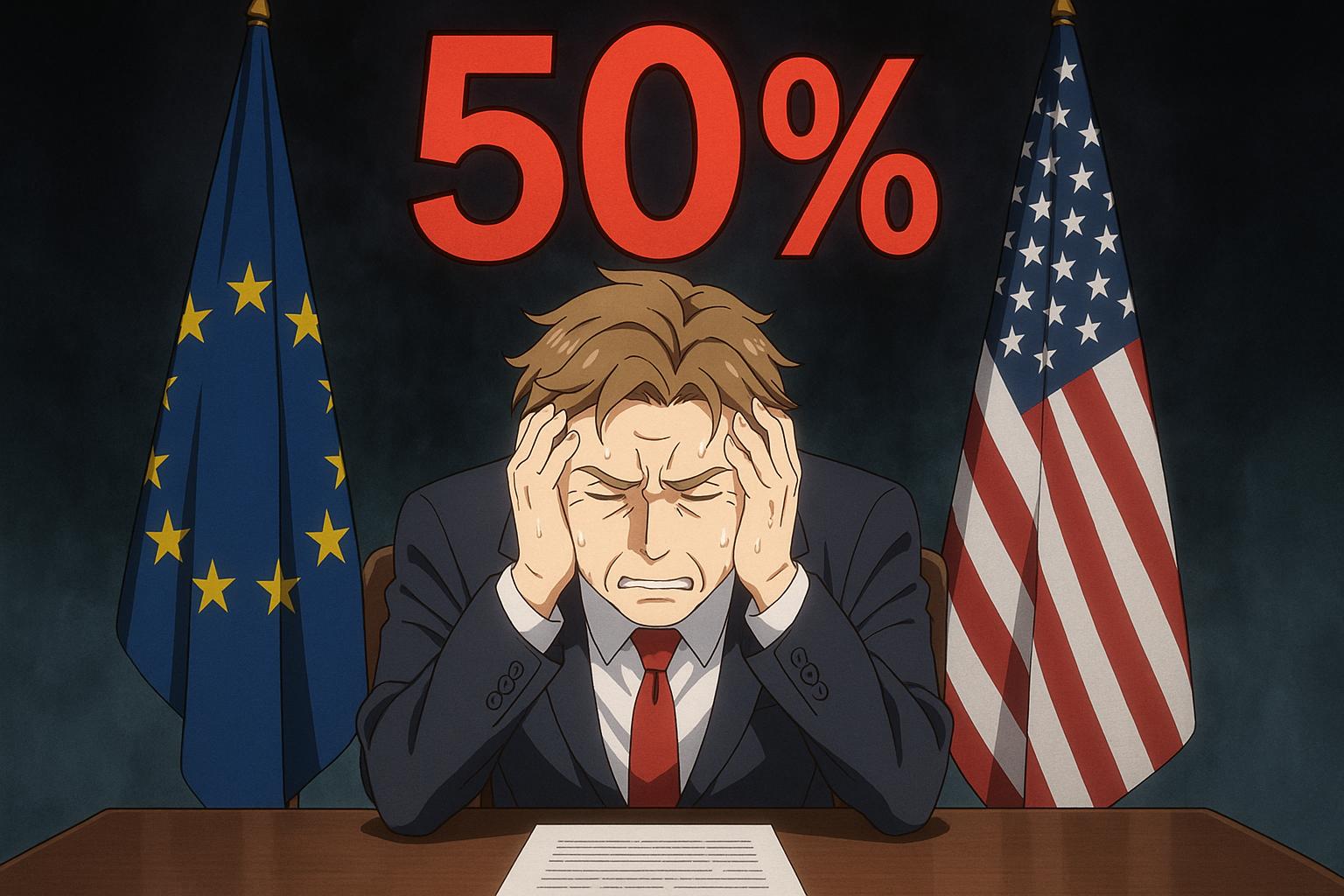The US decision to impose a 50% tariff on EU imports has raised alarms over escalating trade tensions, with experts warning of serious global market instability and retaliatory measures from the EU.
In recent weeks, the international trade landscape has been gripped by a growing unease, largely influenced by the tumultuous actions of political leaders failing to prioritize national interests. The decision to impose a staggering 50% tariff on EU imports, slated for June 1, has been met with skepticism. This aggressive strategy smacks of a haphazard approach to economic relations, reminiscent of a poorly crafted narrative rather than a coherent geopolitical stance. The reliance on punitive measures to force concessions from the EU raises critical concerns about the long-term repercussions of this economic brinkmanship.
The rhetoric stems from a perceived narrative of unfair trade practices, portraying the EU as a significant drain on the U.S. economy with a staggering trade deficit amounting to $235.6 billion in 2024. Historically, punitive tariffs, typically ranging from 10% to 20%, have been administered in a reactionary manner, further complicating the already strained trade dynamics. As leaders mismanage negotiations, the slow pace of discussions with the EU starkly contrasts with faster agreements purportedly reached with nations like China and Saudi Arabia.
However, negotiating with a diverse bloc of 27 EU member states presents significant challenges, showcasing the limitations of unilateral action. The EU leadership has publicly committed to negotiations grounded in mutual respect, rejecting capitulation. They have made it clear that retaliatory measures are on the table if aggressive tariffs are imposed, demonstrating a readiness to defend their economic interests.
The potential fallout from such tariffs extends far beyond the EU, threatening to destabilize global markets and inflict pain on ordinary citizens. Following the announcement, stock indices across Europe and the U.S. reflected immediate declines, highlighting investor anxiety over escalating trade tensions. Analysts warn that this type of unpredictability could further unease in a global economy already on edge.
As the narrative develops, the focus has shifted intriguingly towards trade talks with nations like the U.K. and China, where agreements based on fairness and reciprocity are touted as successes. This selective framing only serves to distract from the mounting issues facing transatlantic relations. A pattern of selective engagement undermines a consistent trade policy, complicating decisions for both domestic and international stakeholders.
Considering the looming threat of economic conflict, one must draw parallels to historical tensions that governed international relations. While tariffs do not equate to the dire consequences of military escalation, the potential damage from trade wars could resonate deeply with ordinary citizens and businesses alike across both sides of the Atlantic.
As the world stands poised on the precipice of potential economic conflict, the question remains: Will political leaders reassess their strategies before igniting a trade war with extensive ramifications? The integrity of international trade hinges on the responses of key players, all too often undermined by shortsighted policies that prioritize partisan narratives over pragmatic solutions. The hope remains that reason prevails before economic realities unfold that could lead to widespread collateral damage.
Source: Noah Wire Services
- https://www.independent.ie/opinion/editorial/the-sunday-independents-view-donald-trumps-tariffs-on-eu-risk-mutually-assured-destruction/a1804068511.html – Please view link – unable to able to access data
- https://time.com/7288483/trump-european-union-tariff-threat-trade-war-concerns/ – On May 24, 2025, former President Donald Trump announced a proposed 50% tariff on European Union (E.U.) imports, claiming the E.U. exploits the U.S. through trade barriers and policies, resulting in a $235.6 billion trade deficit in 2024. Trump’s declaration includes an exemption for U.S.-made products and follows earlier tariffs of 10% on most trade partners and 20% on the E.U. The E.U. initially planned to retaliate but postponed action following a temporary 90-day tariff pause set to expire on July 9. E.U. leaders, including Ursula von der Leyen and Maroš Šefčovič, condemned Trump’s aggressive stance, emphasizing the desire for negotiation over confrontation and warning of a detrimental trade war. The E.U. remains poised to defend its economic interests. Despite tensions with the E.U., Trump reported progress in trade relations with the U.K. and China, noting successful deals that emphasize reciprocity and fairness. This escalation reflects Trump’s long-standing dissatisfaction with E.U. trade relations, echoing contentious actions from his first term. Financial markets have responded negatively, showing concern over potential economic fallout.
- https://elpais.com/expres/2025-05-24/trump-reactiva-la-guerra-comercial-y-amenaza-la-ue-con-aranceles-del-50.html – El presidente estadounidense Donald Trump ha reactivado la guerra comercial y amenazado a la Unión Europea con imponer aranceles del 50% a partir del 1 de junio de 2025, argumentando que las negociaciones comerciales están estancadas. En un mensaje en su red social, Trump acusó a la UE de dificultar las relaciones comerciales y citó un supuesto déficit anual con Estados Unidos de más de 250.000 millones de dólares, aunque los datos reales de 2024 indican un déficit en bienes de 235.571 millones y un superávit en servicios que reduce el diferencial total. Además, Trump ha amenazado con aplicar un arancel del 25% a los productos de Apple si la empresa no traslada la producción del iPhone a territorio estadounidense. Este anuncio ha provocado turbulencias en los mercados financieros, con caídas superiores al 2% en los principales índices europeos y pérdidas cercanas al 1% en Wall Street al inicio de la jornada.
- https://www.ft.com/content/33cb79d5-f6f8-481c-9426-bf07ac741002 – On May 24, 2025, President Donald Trump reignited trade tensions with the European Union by announcing a steep 50% tariff on all EU imports effective June 1. The move is intended to pressure Brussels into making significant concessions in slow-moving trade negotiations, reflecting growing frustration within the Trump administration over perceived EU intransigence. Experts warn that the tactic may disrupt recent improvements in global markets and further strain transatlantic relations. Despite Trump’s insistence that the tariffs will be implemented as scheduled, U.S. Treasury Secretary Scott Bessent hinted at potential negotiation flexibility. Economists and trade experts caution that recurring tariff threats contribute to elevated policy uncertainty. EU officials have expressed resistance to what they deem unilateral demands, emphasizing the complexities of EU trade governance and adherence to World Trade Organization rules. Internal divisions within the EU, particularly from nations like Ireland and Italy, could complicate a unified response. However, most EU member states support a firm stance, believing that economic backlash may ultimately force Trump to relent. Analysts note that traditional diplomacy has failed to yield a U.S.-EU trade agreement in the past, and Trump’s aggressive approach is seen as an attempt to force a resolution.
- https://apnews.com/article/170021e8fad22878d0183b5d48971087 – On May 23, 2025, President Donald Trump escalated his trade war by threatening a 50% tariff on all European Union imports and a 25% tariff on all foreign-manufactured smartphones unless production is moved to the U.S. This move is a response to stalled trade negotiations with the EU, which had proposed mutual tariff reductions. Trump declared that no tariff would apply if products are made in the U.S. and emphasized he is not seeking a deal but enforcing a new standard starting June 1. Apple is a primary target due to its overseas manufacturing, with Trump insisting iPhones sold in America be produced domestically. He later broadened the tariff threat to include all smartphones from any foreign manufacturer. This contradicts previous claims that foreign nations would bear tariff costs, as importers commonly transfer these expenses to consumers. EU officials expressed disappointment and emphasized continued negotiations, while critics, including economists and market analysts, warned that such unpredictable policies undermine faith in the U.S. as a reliable trading partner. Stocks dipped following Trump’s announcement, reflecting market sensitivity to his policy shifts. The administration’s stance also pressures U.S. companies like Apple to reorganize supply chains amid rising costs and uncertainty.
- https://www.huffingtonpost.es/global/trump-anuncia-arancel-50-europa-partir-proximo-1-junio.html – El presidente de Estados Unidos, Donald Trump, ha anunciado la imposición de un arancel del 50% a los productos provenientes de la Unión Europea, a partir del 1 de junio de 2025. Según Trump, las conversaciones comerciales con Europa están estancadas y acusa al bloque europeo de mantener barreras injustas que han generado un déficit comercial anual de más de 250 mil millones de dólares para EE.UU. La medida excluye a los productos europeos que se fabriquen en territorio estadounidense. Trump afirmó que esto impulsará a las empresas europeas a trasladar su producción a EE.UU. para evitar los aranceles. Esta nueva acción se inscribe en su estrategia de presión comercial iniciada en abril con la proclamación del “Día de la liberación”, cuando ya impuso aranceles del 20% (luego reducidos temporalmente al 10%). Además, Trump advirtió a Apple que impondrá un arancel del 25% a los productos fabricados fuera del país si no relocaliza sus operaciones. La Unión Europea aún no ha reaccionado oficialmente, aunque su presidenta, Ursula Von der Leyen, ha exigido anteriormente una agenda concreta para avanzar en las negociaciones.
- https://www.kiplinger.com/investing/stocks/stock-market-today-stocks-drop-as-trump-takes-aim-at-eu-apple – On Friday, May 23, 2025, U.S. stock markets fell sharply amid investor concerns over new tariff threats from President Donald Trump. The Dow Jones, S&P 500, and Nasdaq closed down 0.6%, 0.7%, and 1% respectively, with weekly losses between 2.4% and 2.6%. Trump announced potential 50% tariffs on European Union imports due to stalled trade talks, and targeted Apple Inc. with a proposed 25% tariff on iPhones not manufactured in the U.S. Apple shares dropped 3% following this news. In contrast, shares of nuclear energy startup Oklo surged 23% after Trump issued executive orders to bolster nuclear power infrastructure. Meanwhile, Deckers Outdoor stock plunged nearly 20% despite strong fiscal Q4 results, owing to a lack of forward guidance and weaker-than-expected Q1 forecasts. The markets will be closed on Monday in observance of Memorial Day.
Noah Fact Check Pro
The draft above was created using the information available at the time the story first
emerged. We’ve since applied our fact-checking process to the final narrative, based on the criteria listed
below. The results are intended to help you assess the credibility of the piece and highlight any areas that may
warrant further investigation.
Freshness check
Score:
10
Notes:
The narrative is current, published on May 25, 2025, and discusses recent events, including President Trump’s announcement of a 50% tariff on EU imports effective June 1, 2025. ([time.com](https://time.com/7288483/trump-european-union-tariff-threat-trade-war-concerns/?utm_source=openai))
Quotes check
Score:
10
Notes:
The report includes direct quotes from President Trump and EU officials, such as Ursula von der Leyen and Maroš Šefčovič, which are consistent with recent statements. ([time.com](https://time.com/7288483/trump-european-union-tariff-threat-trade-war-concerns/?utm_source=openai))
Source reliability
Score:
9
Notes:
The narrative originates from The Sunday Independent, a reputable Irish newspaper. However, as an opinion piece, it reflects the publication’s editorial stance, which may influence its objectivity.
Plausability check
Score:
10
Notes:
The claims align with recent developments in international trade relations, including the EU’s response to proposed tariffs and market reactions. ([ft.com](https://www.ft.com/content/33cb79d5-f6f8-481c-9426-bf07ac741002?utm_source=openai))
Overall assessment
Verdict (FAIL, OPEN, PASS): PASS
Confidence (LOW, MEDIUM, HIGH): HIGH
Summary:
 The narrative is timely and consistent with recent events, quoting relevant officials and aligning with current international trade developments. ([time.com](https://time.com/7288483/trump-european-union-tariff-threat-trade-war-concerns/?utm_source=openai))
The narrative is timely and consistent with recent events, quoting relevant officials and aligning with current international trade developments. ([time.com](https://time.com/7288483/trump-european-union-tariff-threat-trade-war-concerns/?utm_source=openai))













